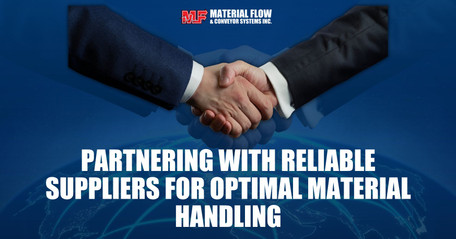Partnering with Reliable Suppliers for Optimal Material Handling
15th Jan 2024
In today's competitive business environment, optimizing material flow systems is crucial for organizations to achieve warehouse operations excellence and gain a competitive edge. Material handling systems encompass the movement, storage, control, and protection of materials throughout the supply chain, from raw material acquisition to finished product distribution. Selecting the right material handling equipment supplier plays a pivotal role in ensuring seamless and efficient material flow, ultimately impacting an organization's overall productivity, profitability, and customer satisfaction.
The Importance of Reputable Suppliers
Partnering with a reliable material handling equipment supplier for long-term success offers a multitude of benefits that extend far beyond simply acquiring equipment. A reputable supplier acts as a trusted advisor, providing expert guidance and support throughout the entire material handling process, from initial consultation to equipment installation, training, and after-sales service. Their industrial equipment expertise can help organizations make informed decisions about equipment selection, system design, and implementation, ensuring that their material handling supplier selection aligns with their specific needs and objectives.

A reputable supplier also prioritizes quality and adheres to stringent industry standards, ensuring that the equipment they provide is not only functional but also safe, durable, and reliable. This commitment to quality material transport translates into reduced downtime, lower maintenance costs, and an extended equipment lifespan, contributing to long-term cost savings and operational efficiency.
Furthermore, a reputable supplier understands the importance of innovation and continuously strives to develop cutting-edge solutions that address evolving industry needs. They invest in research and development, staying ahead of technological advancements and incorporating them into their products and services to optimize supply chain efficiency. This forward-thinking approach ensures that organizations can leverage the latest innovations to enhance their material handling processes and gain a competitive advantage.
The Value of Competitive Pricing
While quality and reliability are paramount, cost-effectiveness is also a critical factor when selecting a material handling equipment supplier. Competitive pricing on material flow and conveyor systems allows organizations to optimize their capital expenditures without compromising on quality or performance. A supplier who can offer competitive pricing without sacrificing quality demonstrates their commitment to providing value for their customers.
However, it's essential to strike a balance between price and quality. The lowest price may not always guarantee the best value. Consider the supplier's reputation, the quality of their equipment, the level of support they provide, and the long-term cost of ownership. A slightly higher upfront cost may translate into significant savings in the long run due to reduced downtime, lower maintenance expenses, and a longer equipment lifespan.
Finding the Right Partner: A Strategic Approach
Selecting the right material handling equipment supplier is a strategic decision that can significantly impact an organization's operational efficiency, productivity, and overall success. To identify the best partner, organizations should adopt a comprehensive and methodical approach:

Define Requirements: Clearly outline the specific material handling needs and objectives. Consider factors such as the type of materials being handled, the volume of material flow, the layout of the facility, and the desired level of automation.
Research and Shortlist: Conduct thorough research to identify potential suppliers with a proven track record in the industry. Consider factors such as their experience, expertise, product portfolio, customer reviews, and certifications.
Evaluate and Compare: Request detailed proposals from shortlisted suppliers, including equipment specifications, pricing, service offerings, and warranty terms. Compare each proposal carefully, considering both qualitative and quantitative factors.
Engage in Dialogue: Engage in open and transparent discussions with potential suppliers to assess their understanding of your needs and their ability to provide solutions that align with your objectives.
References and Testimonials: Seek references from existing customers to gain insights into the supplier's performance, customer service, and overall reputation.
Negotiation and Contract: Negotiate a mutually beneficial contract that clearly outlines the terms and conditions of the partnership, including pricing, delivery schedules, warranty coverage, and service level agreements.
Conclusion
Navigating the complex material handling landscape requires a strategic approach that emphasizes both quality and cost-effectiveness. By partnering with a reputable and competitively-priced supplier, organizations can leverage expert guidance, innovative solutions, and reliable equipment to optimize their material flow processes, enhance productivity, and achieve operational excellence in today's competitive marketplace.



